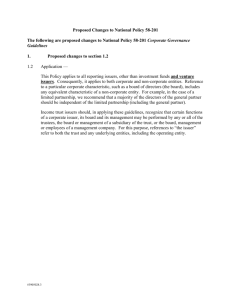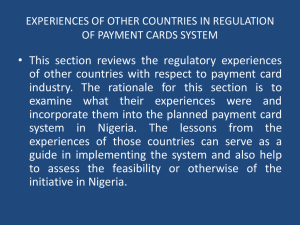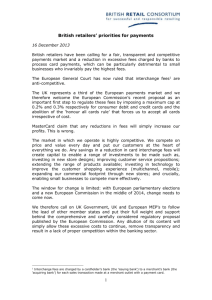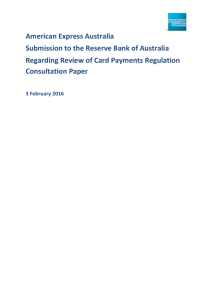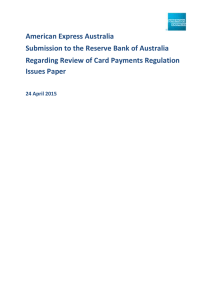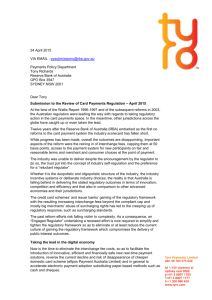NATIONAL BILLING GROUP PTY LTD PO BOX 566 NORTH
advertisement
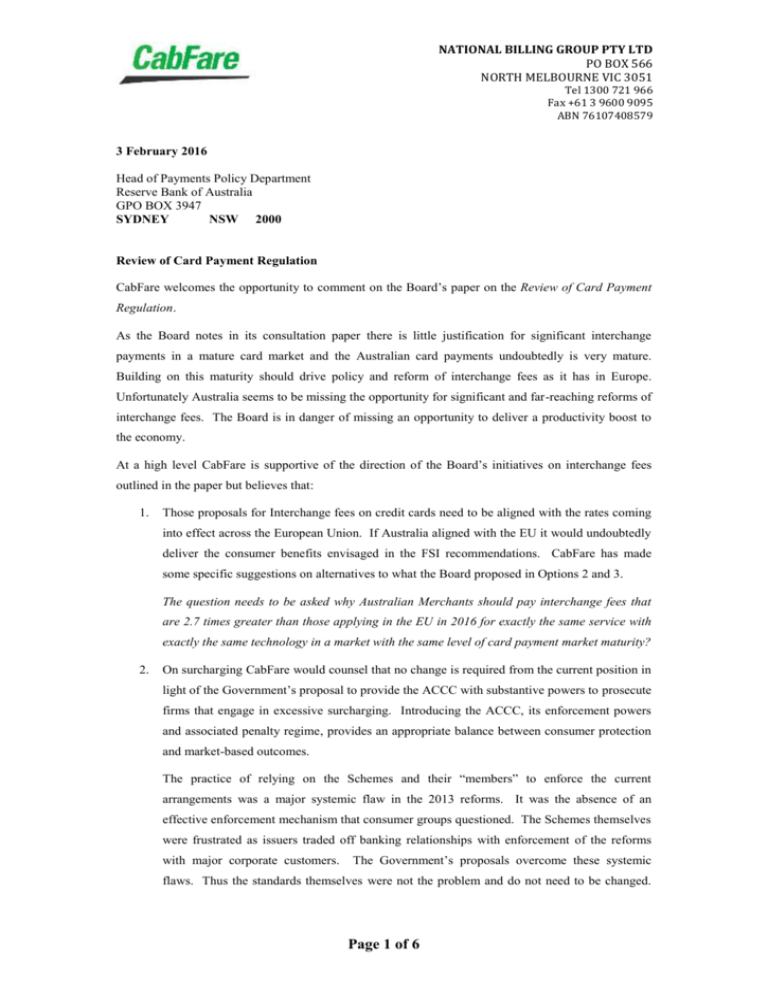
NATIONAL BILLING GROUP PTY LTD PO BOX 566 NORTH MELBOURNE VIC 3051 Tel 1300 721 966 Fax +61 3 9600 9095 ABN 76107408579 3 February 2016 Head of Payments Policy Department Reserve Bank of Australia GPO BOX 3947 SYDNEY NSW 2000 Review of Card Payment Regulation CabFare welcomes the opportunity to comment on the Board’s paper on the Review of Card Payment Regulation. As the Board notes in its consultation paper there is little justification for significant interchange payments in a mature card market and the Australian card payments undoubtedly is very mature. Building on this maturity should drive policy and reform of interchange fees as it has in Europe. Unfortunately Australia seems to be missing the opportunity for significant and far-reaching reforms of interchange fees. The Board is in danger of missing an opportunity to deliver a productivity boost to the economy. At a high level CabFare is supportive of the direction of the Board’s initiatives on interchange fees outlined in the paper but believes that: 1. Those proposals for Interchange fees on credit cards need to be aligned with the rates coming into effect across the European Union. If Australia aligned with the EU it would undoubtedly deliver the consumer benefits envisaged in the FSI recommendations. CabFare has made some specific suggestions on alternatives to what the Board proposed in Options 2 and 3. The question needs to be asked why Australian Merchants should pay interchange fees that are 2.7 times greater than those applying in the EU in 2016 for exactly the same service with exactly the same technology in a market with the same level of card payment market maturity? 2. On surcharging CabFare would counsel that no change is required from the current position in light of the Government’s proposal to provide the ACCC with substantive powers to prosecute firms that engage in excessive surcharging. Introducing the ACCC, its enforcement powers and associated penalty regime, provides an appropriate balance between consumer protection and market-based outcomes. The practice of relying on the Schemes and their “members” to enforce the current arrangements was a major systemic flaw in the 2013 reforms. It was the absence of an effective enforcement mechanism that consumer groups questioned. The Schemes themselves were frustrated as issuers traded off banking relationships with enforcement of the reforms with major corporate customers. The Government’s proposals overcome these systemic flaws. Thus the standards themselves were not the problem and do not need to be changed. Page 1 of 6 They just need to be underpinned by an enforcement regime and the Government has moved to provide that. CabFare’s response to the Bank’s specific issues for consultation is as follows: Interchange Fees Level – a New Way and a Viable alternative Option: CabFare’s view is: 1. That the continued use of “ad valorem” interchange fees for Credit transactions has not been substantiated. Whilst introducing a cap of 0.80% (Option 2) is commendable it continues a practice in which merchants bear an unacceptably high burden particularly as there are a disproportionate number of cards and transactions (both by volume and $ value) are attached to “premium, commercial, and international”. There is no reason advanced for “ad valorem” pricing other than: i. It has always been done that way, and ii. Varying it to a flat fee with reduce issuer and scheme revenues. Neither of these constitutes grounds to retain “ad valorem” pricing. 2. If “ad valorem” is to be retained for credit cards than a preferable alternative would involve a mixture of Option 2 and Option 3 namely: i. Introduce a cap of 0.30% on all credit cards in line with the EU interchange fees applying from June 2016. ii. Even 0.80% the Board has proposed this represents an excessive impost on Merchants particularly as there is no additional benefit delivered to Merchants from processing “premium, commercial, and international” cards” especially when combined with a weighted average mechanism. The only beneficiaries of such a high fee are the cardholder, the issuer, and the scheme. It is those parties who should bear the full cost of the entitlements associated with those cards. Whilst this may make them less attractive in the market place Merchants, as the soft target, should not be the party funding the programs. The use of “ad valorem” interchange fees on these cards is symptomatic of the asymmetric outcomes for cardholders and merchants in their relationship with issuers. 3. The question needs to be asked why Australian Merchants should pay interchange fees that are 2.7 times greater than those applying in the EU for exactly the same service with exactly the same technology in a market with the same level of card payment market maturity? 4. The introduction of a flat fee for all debit card transactions is supported BUT it should be capped to $0.05. 5. Moving to a flat fee for all interchange fees for all cards might encourage issuers to focus on their unsecured credit risk pricing it appropriately with cardholders or rein in the credit provision. Page 2 of 6 A Viable Alternative to What is Currently on Offer from the Board A viable option to deliver effective reform and greater productivity would be to implement a flat fee of $0.05 for all credit and debit card transactions below $100.00, irrespective of card type. This would i. Alleviate the burden of policing surcharges, particularly for small value transactions below $100. ii. Align with the Scheme’s contactless payment threshold facilitating their objective to move cash to card for small value transactions. iii. It would allow the Schemes and Issuers to retain their arrangements with “premium, commercial, and international” for all transactions in excess of $100.00. iv. Enable the Board to retain a weighted average fee for all transactions over $100 at a cap of 0.80%. v. Enable the impact of flat fees to be explored with the potential to expand the threshold level in the future. Benchmark Compliance and The Weighted Average Fee Framework – using it as a lever to deliver productivity gains for end users from Schemes and Issuers: 1. The current practice has been subject of extensive regulatory gaming for many years. The impact of this gaming has resulted in higher costs to SME Merchants. 2. CabFare’s position: i. CabFare supports the reduction of the period over which the Weighted Average is calculated to 3-month cycles, although this probably is still excessive and “sharp minds in schemes and issuers” will game the system to their advantage. ii. In determining the Interchange fee the Board should not only prescribe the fee but also the outcome fee that it wishes to see as the weighted average in 3 years. This should be set at the 50th percentile of the starting fee so that there is a downward glide path delivering the productivity/technology benefits in the card payment system to end users as well as to the issuers. This is similar to the model now applied in network industries in the UK to generate productivity outcomes. The card payment industry could benefit from an ethos to deliver productivity goals. iii. If a glide path is implemented then it will limit gaming and deliver efficiencies to the wider economy. iv. After 3 years the Board should undertake a regulatory reset to deliver productivity outcomes delivering a 3-year rolling cycle of productivity gains to end users from the schemes and issuers. Scheme Payments to Issuers CabFare supports the Board’s Option 2 to regulate and prescribe limits on payments by schemes to issuers. What the Board does in this regard should be directed at ensuring that all payments are transparent to the wider community when they are entered into by way of reporting to the Board on a Page 3 of 6 quarterly basis including the quantum of the payment, the purpose of the payment, the recipients of the payment, and the individuals who authorised the payment. CabFare is of the view that: 1. These payments, described as marketing incentives, are questionable especially given the tightly coupled relationships between schemes and card issuers. Both the Card Issuers and the Schemes are public corporations and the use of such payments opens significant issues of governance and transparency. 2. Whilst incentives may enable employees to achieve their personal performance objectives the evidence is that such incentives distort behaviour and are never in the customer’s or shareholder interests. 3. Such incentives introduce inefficiencies into the card payment system. Payment of incentives disguises the ability to extract maximum productivity and efficiency in the wider payment system. In reality they are funded by SME Merchants in particular. Accordingly they need to be eliminated from the system as part of a clean up by the Board. 4. The penalty regime for breaching the prohibition of such payments needs to be significant and directed not only at the Corporate level but also at the individuals. The experience in other “white collar” regulatory fields is that unless the sanctions are significant, with the potential for criminal prosecution and imprisonment of individuals, there will be little behavioral change when flouting the regulations delivers significant personal rewards. Surcharging: The debate on this issue, as usual, is dominated by simplistic and extreme solutions in the populist press and at the political level. Predicating policy and leglislative intervention on “Change.Org” petitions is not evidence-based policy formulation but evidence of the herd mentality at its worst. The debate on surcharging at a political level is symptomatic of shallow quick fix solutions, opportunism, and the perilous lure of scapegoating. The Board is to be commended for its thought through and considered analysis of this complex issue. As the Board’s own research demonstrates surcharging is not wide spread but despite this we are being forced to revisit the issue and possibly develop even more complex and costly mechanisms. As the economic literature on card payment systems amply demonstrates surcharging: 1. Is the only mechanism to deliver transparency of interchange fees and other costs incurred by merchants in providing card payment facilities to consumers. Fee transparency, via surcharging, is a preferable outcome for consumers to incorporating fees into the cost of the product as advocated by some critics of surcharging. Pricing card fees into product pricing results in excessive pricing for all consumers as costs are smeared across all consumers. This is an unacceptable outcome Accordingly surcharging enhances the consumer welfare for all consumers electing payment methods outside of cards. Understandably issuers and schemes prefer to hide the costs of acceptance from the cardholder portraying it as a “free good”. Page 4 of 6 2. Redresses, in part, some of the asymmetrical relationship in the card payment system between merchants, issuers, and cardholders where issuers/schemes favour the latter to secure loyalty at the expense of merchants given the growth of premium, commercial and international card transactions. 3. Is NOT inherently bad and has delivered more efficient outcomes in card payment systems in jurisdictions where it is allowed as opposed to jurisdictions it is prohibited. The Taxi Industry and Non Standard Models We note that the Board has taken on board the distinctive characteristics of he Taxi Industry and the plethora of State regulations it is required to meet which cap surcharges at 4.54%. In CabFare’s view those States without a cap Option 1 will meet their regulatory requirements when that is coupled with the Government’s initiatives with respect to vesting the ACCC with investigative and enforcement powers on surcharging. In terms of other industries where non-standard models might exist we believe that there are other services industries which similar characteristic to Taxis. These often form part of the cash economy, involve “casualised” employment (so called “Precariat Class”), and individuals operate without access to card payment facilities. A Merchant Network Service Provider could offer card payment services. Accordingly the Board should be open to the emergence of other industries charging reasonable costs of acceptance that involves a non-standard payment model similar to Taxis. The Government’s Reforms to the Competition and Consumer Act finally enables the Current Surcharging determination and Guidelines to be implemented The Government’s proposal to provide the ACCC with substantive powers to prosecute firms that engage in excessive surcharging is a significant change, absent from the existing arrangements. Introducing the ACCC, and its enforcement powers with its associated penalty regime provides an appropriate balance between consumer protection and market-based outcomes. The practice of relying on the Schemes and their “members” to enforce the current arrangements was a major systemic flaw in the last round of reforms. It was the absence of an effective enforcement mechanism that consumer groups questioned. Further the Schemes themselves were frustrated as issuers traded off banking relationships with enforcement of major corporate customers. The Government’s proposals overcome these systemic flaws. Thus the standards themselves were not the problem and do not need to be changed yet again. They just need to be underpinned by an enforcement regime and the Government has moved to provide that. Accordingly CabFare is of the view that Option 1 “No Change to the existing definition of reasonable costs of card acceptance” is the preferred course of action. This position would allow: 1. The Government’s reforms to provide the ACCC with specific regulatory powers to enforce surcharging to be implemented. 2. The impacts of the Board’s decisions on interchange fees to flow through the system enabling Merchants to adjust their approaches to surcharging. Page 5 of 6 3. If the Board moved to a flat interchange fee of $0.05 for both credit and debit transactions below $100, then monitoring compliance under the existing surcharging regime would be simpler for a significant cohort of transactions. 4. Option 3 as proposed by the Board is unlikely to meet the expectations of the “herd”. They are either unwilling or unable to understand the complexities of the payment system and the interplay between the various actors. In summary A summary of CabFare’s is position on the Board’s consultation paper is that the Board should: 1. Use the opportunity of Interchange Fee reform to deliver solutions that target extracting greater productivity from the Card Payment System both today and going forward. 2. Address the question as to why Australian Merchants should pay interchange fees that are 2.7 times greater than those applying in the EU for exactly the same service with exactly the same technology in a market with the same level of card payment maturity? 3. Move to regulate a flat interchange fee for all credit and debit transactions below $100 of $0.05 per transaction, irrespective of card type, that will assist and simplify surcharging enforcement and administration by all participants in the card payment industry. 4. Tighten the “weighted averaging” regime to minimise gaming by schemes and issuers, as it delivers no discernable benefits to merchant end users in its current form. 5. Introduce a glide path for interchange fees such that the outturn on these fees in 3 years is designed to target ongoing rolling productivity gains consistent with a mature industry. 6. Move to eliminate payments by schemes to issuers with a transparent framework of public reporting, penalties, and sanctions at both the corporate and individual level for each scheme and issuer. 7. Retain the current surcharging provisions (Option 1), and allow the Government to enact the changes to the Competition and Consumer Act, allow the ACCC to deliver the enforcement framework lacking in the current arrangements. This will address the key concerns from consumer groups and the schemes when these standards were implemented in 2013. We are available to meet with the Board to discuss any element of this submission in further detail. Yours sincerely, David R. Hamilton General Manager Strategy and Regulation Page 6 of 6
